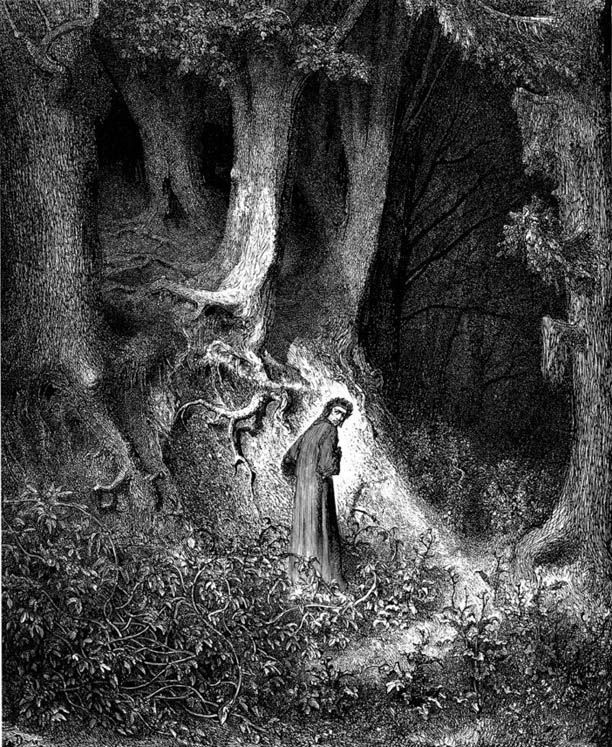What Does The 3 Animals Represnt Sin Dante Inferno
I constitute myself within a forest dark, Langdon thought, recalling the ominous first canto of Dante's masterwork, for the straightforward pathway had been lost.
(Dan Brownish, Inferno)
Inferno one is the offset canto in Dante's Divine Comedy and perhaps the most famous of the ballsy verse form.
Dante, author and protagonist of the poem, is in the middle of the journey of his life, in a dark forest. Information technology is horrible, tangled, and wild, and simply the retentiveness of it makes Dante scared. He did non realize what happened considering his soul was sleepy and numb.

The events of the Divine Comedy are set around 1300 because Dante was born in 1265 and rumored to be in the middle of his earthly life, which at that fourth dimension was considered to be well-nigh 70 years.
Dante imagined a scary forest every bit a metaphor for sin. While he seeks a way out of the forest, he meets three beasts: a leopard, a lion, and a wolf. They force Dante back into the night forest.
The three beasts are allegories of three different sins: the leopard represents lust, the king of beasts pride, and the wolf represents avarice.
While Dante goes backward to the forest, he sees a human effigy and turns to it for help. Dante, however, cannot distinguish whether it is a man or a shadow.
The shadow tells him that he was a man, more precisely the ancient Roman poet Virgil, besides known as Publius Vergilius Maro, and begs Virgil to costless him from the danger in the wilderness.
Virgil suggests that he take a different direction because the wolf is too dangerous and will ultimately kill him. Virgil tells Dante that the work of the wolf volition proceed on world until a savior comes to liberate the world.
Virgil'due south prophecy is very dark, and it'south about a savior who volition exist nourished with wisdom, dear, and virtue, and who will drive away the wolf into the hell.
The savior volition be built-in in "felt," Virgil says.
Even today no one knows for sure what Dante meant by the give-and-take "felt." Perhaps it ways humble origins or belonging to religious orders that wore felt. This is one of the many mysteries that Dante deliberately leaves unresolved in his poem.
Virgil explains to Dante that if he wants to exist saved he must become through Hell and Purgatory and offers to guide him.
Then Virgil says that if Dante wants to become to Heaven someone else must accompany him―Beatrice―because God does non allow pagans to enter. Virgil was born in ancient Rome before Christendom spread, so he was a skillful person but non a Christian.
Dante accepts, and the two poets begin their journey.
In this offset part of his poem, Dante makes it clear to the reader that the story he is telling is not a personal story but the story of all human beings.
The loss and the journey he takes from sin to salvation belong to everyone'south experience.
As mentioned above, 1300 is a special yr in the life of Dante: He finds himself in the middle of his earthly journey and thinks virtually his life afterward decease.
We must not forget that 1300 was also the year in which the struggles between the Guelphs and Ghibellines in Florence were at their peak, and this year was also the year of the first Christian jubilee.
Opportunities for Dante and everybody else to repent and see their sins erased cheers to this Christian commemoration.
In the class of the poem, Dante appears every bit Dante Alighieri, with unique characteristics of man. Only in this canto, he is yet a symbol, the symbol of humanity lost in the wilderness of sin.
Practise you fancy to read The Divine Comedy? If yes, we reccomend to start with the Mandelbaum edition.

The Divine Comedy by Dante Alighieri
with commentary past American professor Allen Mandelbaum, a popular mod rendition which includes forty-two Botticelli's illustrations
More information »





Source: https://www.florenceinferno.com/canto-1-dante-alighieri/#:~:text=While%20he%20seeks%20a%20way,and%20the%20wolf%20represents%20avarice.
Posted by: behlerquied2000.blogspot.com

0 Response to "What Does The 3 Animals Represnt Sin Dante Inferno"
Post a Comment